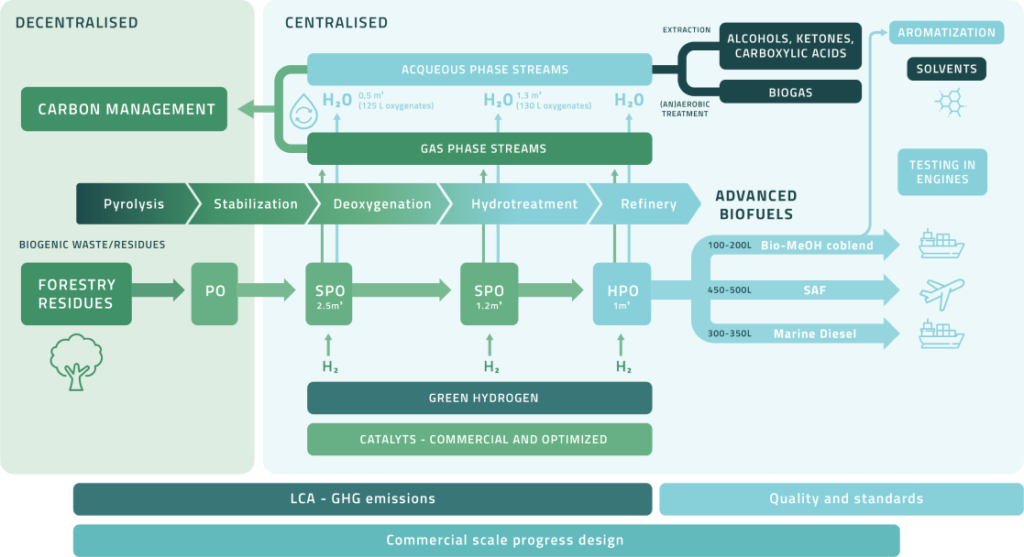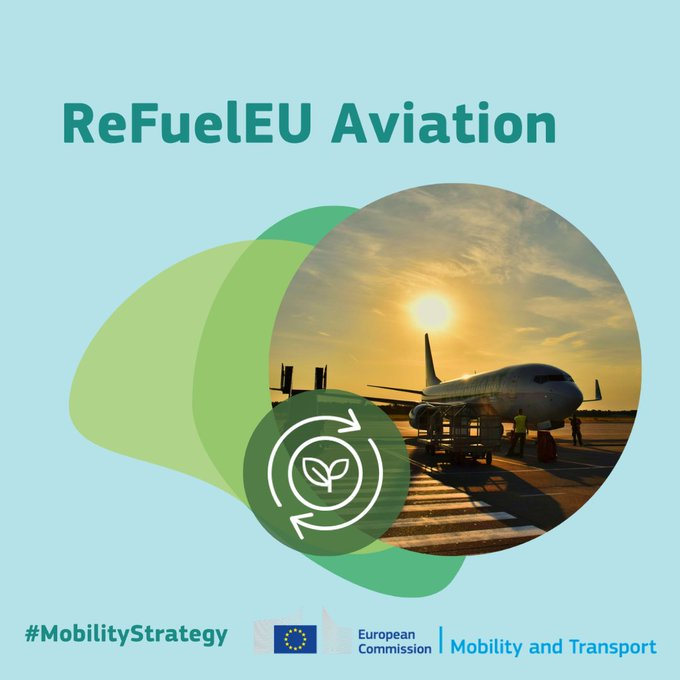Advanced biofuels are an essential solution to achieve the European objectives for tackling climate change. According to the International Energy Agency (IEA)‘s “Net Zero by 2050” report, advanced biofuels can provide 14% of global transport fuel, 45% of global aviation fuel by 2050, achieving reductions of around 2.1 Gt of CO₂ emissions per year when produced sustainably.
ReFuelEUAviation promotes the increased use of sustainable aviation fuels (SAF) as the single most powerful tool to decrease aviation CO2 emissions. The measure is part of the Fitfor55 package to meet the emissions reduction target of 55% by 2030. It sets requirements for aviation fuel suppliers to gradually increase the share of SAF blended into the conventional aviation fuel supplied at EU airports.
More than 95% of air transport departing from EU airports will be covered by this new regulation which replaces any national mandates on SAF in Member States, giving a clear signal and market certainty for the large-scale deployment of SAF.
For the marine sector, the FuelEUMaritime Regulation, entering into force from 1 January 2025, promotes the use of renewable, low-carbon fuels and clean energy technologies for ships, essential to support decarbonisation in the sector. FuelEU Maritime sets maximum limits for the yearly average greenhouse gas (GHG) intensity of the energy used by ships above 5,000 gross tonnage calling at European ports, regardless of their flag. Targets will ensure that the greenhouse gas intensity of fuels used in the sector will gradually decrease over time, starting with a 2% decrease by 2025 and reaching up to an 80% reduction by 2050.
In addition, the International Maritime Organization has signalled a 70% reduction in emissions from ships by 2025.
However, there are some challenges that need to be addressed in order to scale up the production and use of advanced biofuels:
- Increased production capacity of advanced biofuels from sustainable biogenic residues and wastes to replace fossil fuels.
- As present, hydrotreating of pyrolysis oils has not yet been demonstrated at commercial scale.
- Improved efficiency and technological innovation of the conversion processes while reducing energy consumption and increasing yields. There is a definite need to convert biomass especially into fuels in the aviation and marine diesel range.
- A clear certification framework to enable the deployment of fuel specifications for pyrolysis-based aviation/marine fuels at commercial scale and to ensure the quality, safety and sustainability of their use.
- Cost-effective solutions to improve the competitiveness of advanced biofuels in the marketplace
- New market to be developed to promote the uptake of advanced biofuels, and their integration into existing fuel production schemes
FUEL-UP is a new EU Horizon funded project aimed at transforming biogenic waste into advanced biofuels to enable the green transition and the defossilization of the aviation and marine transport sectors.
FUEL-UP will provide solutions to make a paradigm shift towards the production of renewable sustainable aviaton fuels (SAF) and marine fuels by producing stabilized deoxygenated pyrolysis oils (SDPO) from pyrolysis oils (PO) derived from 100% biogenic feedstock that can be subsequently processed towards a fully hydrotreated oil in a refinery.
The project will, therefore, validate, at demo scale, a route to produce sustainable liquid biofuels from lignocellulosic streams with 45-50% aviation fuel, 30-35% in the marine diesel range and 20% heavy naphtha at technology readiness level-7 (TRL-7).

The FUEL-UP process is also expected to improve energy efficiency and contribute to several Sustainable Development Goals.
Key objectives of the project include:
- Demonstrating the full value chain of production of advanced biofuels: FUEL-UP will showcase a viable pathway for creating advanced biofuels from readily available resources such as lignocellulosic feedstock and biogenic waste, thus offering a practical solution for de-fossilizing key industries.
- Accelerating the cost-effective conversion of biomass into SAF and marine biofuels: By demonstrating efficient methods like pyrolysis, oil upgrading, refining and utilization of byproducts the project aims at ensuring biofuel price parity and at responding to market demand in biofuels.
- Boosting economic productivity and competitiveness: FUEL-UP is expected to contribute to achieving higher levels of economic productivity through diversification, technological upgrading and innovation.
- Mitigating climate change: FUEL-UP aims at achieving up to 80% reducton in GHG emissions compared to fossil fuels and 47% compared to the state-of-the-art advanced biofuels and at providing scenarios for green hydrogen production.
- Paving the way to marine and aviation fuel certification of products and processes in order to ensure that production is compatible with practical usage, and it is socially accepted.
FUEL-UP, coordinated by SINTEF has been launched on 1 January 2024 and has a consortium of 12 partners from 8 different EU countries: SINTEF Ocean (Norway), B.T.G. Biomass Technology Group B.V. (The Netherlands), @BTGNext (The Netherlands), Tüpraş (Türkiye), Ranido (Czech Republic), Avecom (Belgium), German Aerospace Center (DLR) (Germany), AristEng Sarl (Luxembourg), ETA-Florence Renewable Energies (Italy), Luxembourg Institute of Science and Technology (LIST) (Luxembourg), Ketjen Corporation (The Netherlands).

